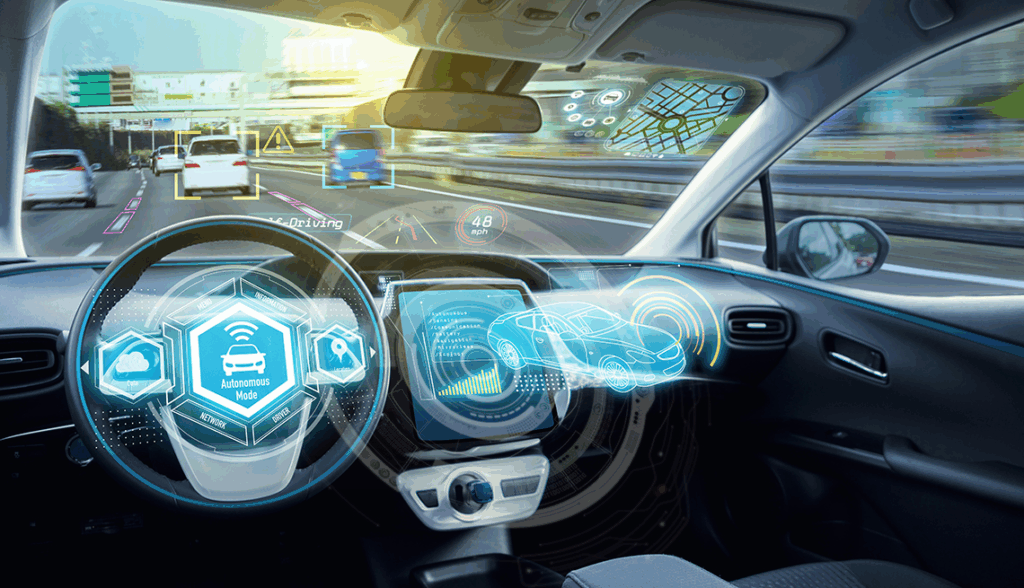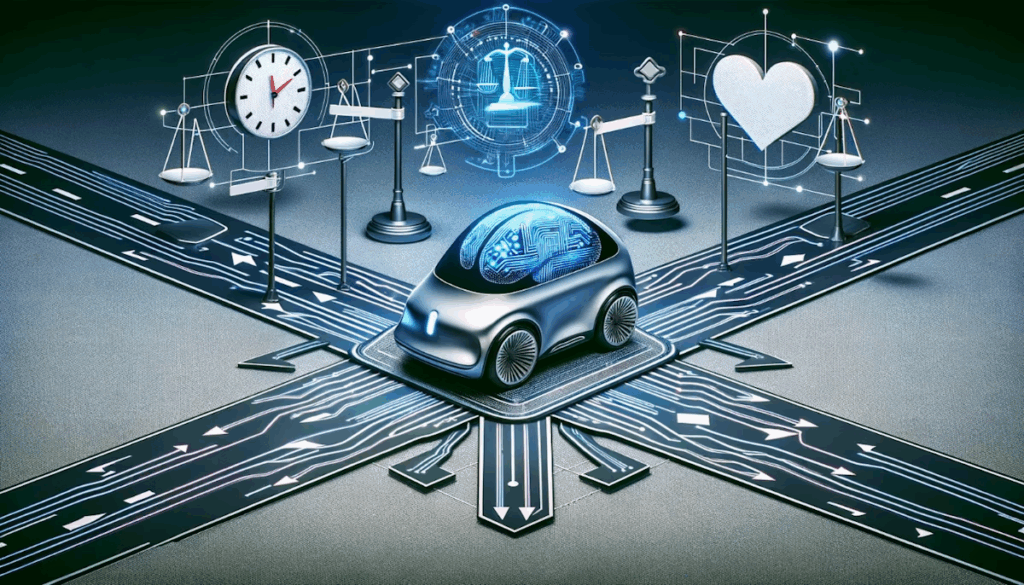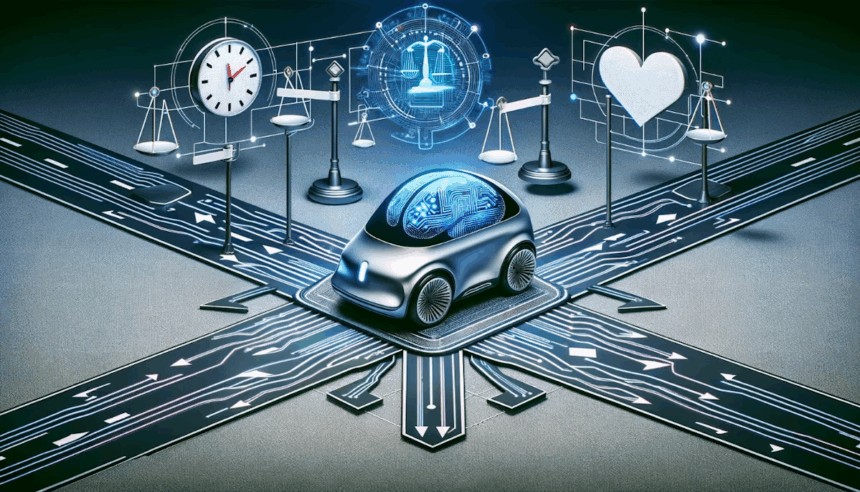I will talk about the What is Self-Driving Car Technology and Its Ethical Implications. Self-driving cars use artificial intelligence and other technologies to make real-time driving decisions without human interaction.
It can make driving decisions, navigate, and operate any form of transportation. These driverless cars offer several benefits and improved safety, however, concerns about responsibility, privacy, and impact on society must also be addressed.
What is Self-Driving Car Technology?
Self-driving cars (Autonomous Vehicles or AVs) are capable of moving without the aid of the human. They are equipped with advanced sensors, cameras, radars, GPS, and artificial intelligence which helps them calculate and analyze traffic systems in real life.

They are able to ‘see’ and ‘understand’ their environment. All of this information is processed real time to make split second driving decisions.
Self-driving cars make life more easier in many ways, they are able to minimize human error and reduce the more prominent road safety concerns. Self driving cars are also very beneficial to people who are incapable of driving as they provide more mobility.
What is Self-Driving Car Technology and Its Ethical Implications

Autonomous vehicles (AV), also referred to as self-driving vehicles, possess the capability to maneuver the roads, manage speed and traffic conditions, without any human involvement. In order to function, these vehicles require the aid of multiple sensors, cameras, radars, and GPS systems, as well as the implementation of artificial intelligence.
From their mental model of the world, the AVs will make predictions in real-time about the movement of pedestrians and other drivers. Although the technology will increase safety, limit traffic accidents, enhance mobility for the elderly and disabled, and optimize traffic flow, AV technology will still face various ethical dilemmas.
In the case of unavoidable accidents, the driverless car must prioritize, for example, the passengers and pedestrians. Blame and responsibility seem to rest primarily with the AV manufacturers or software developers, rather than the driver.
The sheer volume of data collected also poses a concern for privacy, and the impact of society as a whole which in this case, includes the loss of employment opportunities as well as inequality, must also be considered. The innovation AV vehicles bring must be balanced with the ethical responsibility to the society they serve to make sure they are safe as well as beneficial for everyone.
Ethical Implications of Autonomous Vehicles
The technological capabilities of autonomous vehicles pose numerous ethical dilemmas. Some of these dilemmas include the “trolley problem,” where the vehicle is forced to decide whether to spare the lives of the occupants of the vehicle or the pedestrians when an accident is inevitable.
These “life-and-death” decisions pose the first ethical dilemma. But who is to blame in these situations, the vehicle or the person who claims ownership to it? The legal and insuring systems of the emerging world will have to answer this question.
Privacy is also at stake, as self-driving cars violate personal space by collecting location data, track habits and perform environmental scans. The misuse of this data is what makes it more dangerous.
Finally, the loss of jobs to autonomous cars in the world of driving is the last ethical dilemma. Because of these ethical dilemmas, self driving cars can’t be claimed safe to the society. Failing to provide a balance to the outlined arguments, self-driving cars will be claimed unsafe, biased and to lack ethical considerations.
Advantages of Self-Driving Car Technology
Improved Safety
- Self driving cars could help eliminate human error in driving which remains one of the primary causes of motor vehicle accidents.
- AI, coupled with sensors, helps the vehicle avoid possible obstacles faster than humans.
Broader Scope of Mobility
- Self driving cars help disabled, elderly, and even some blind persons move around freely without any assistance.
- They uplift and augments freedom, convenience, and thus, overall satisfaction in life.
Greater Traffic Coordination
- These vehicles can help in better controlled automated driving with traffic jams in real time, spacial management, and lane changes.
- They utilize communication between cars to understand traffic patterns for a more fluid driving experience.
Global Warming
- better traffic management helps in the increased deployment of electric self driving cars, reduces the need for fuel, and thus helps the environment.
- Autonomous cars aid in the driving of these vehicles to refuel, thus letting them eliminate human operators.
Business and Urban Development
- These vehicles help in the distribution of goods and automated driving, along with relaxed parking constraints.
- They assist in the planning for reduced traffic to these regions in cities.
Mental Peace for Passengers
- People can devote their full attention to their work, rather than being mentally tense for the traffic or driving.
- For work, self-driving cars help save time by completing multiple tasks at once.
Increase of Mobility Opportunities
- These vehicles enable more smart city services to be implemented, with increased potential for ride sharing and autonomous taxis.
- Promotes scientific and technological advancements in AI, sensors, and connectivity.
Safety and the Trade-Offs of Constructing a Traffic System
Finding a perfect balance between cost, safety and efficiency when designing a traffic system can prove to be a very daunting task. There has never been a road able to eliminate accidents while also providing unclogged traffic flow.
There is no such technology which is affordable and able to meet perfect safety requirement. For instance, there have been roads with more than 4 lanes and multiple traffic counters which end up bringing more congested and having more accidents.
Like pedestrian crossings and overly enforced speed limits and traffic calming measures enhance safety, they also lead to sluggish moving vehicles. There has to be a perfect balance between life lost and the money spent in actively monitoring the traffic.
Regulatory and Societal Considerations
The regulation and societal aspects touches on the self-driving cars deployment on a great deal. The regulation and societal aspects touches on the self-driving cars deployment on a great deal.
Governments set the safety regulation autnomous vehicles which includes operational dependability and public safety testing and monitoring. Moreover, legal regulation about liability, data and cyber security of the autonomous vehicles, which collect a lot of info, will also be needed.
Societal issues also matters such as losing professional driver jobs, spending public money, egoistic use of the technological privilege, nay-saying people, and public confidence on the self-sufficient driverless cars along with self-driving cars societal issues.
It is important to find a balance between autonomous and self-driving vehicles. It is important to find a balance between autonomous and self-driving vehicles.
Challenges and Future Outlook

There are still a number of hurdles self-driving cars will need to overcome before they can be adopted on a larger scale. There is a lack of legislation around the technology meaning liability, needed insurance, along with safety certifications, will be complex.
The public’s perspective on the technology is also very important, as they need to be sure that the self-driving cars are reliable and, as the term goes, safe. There is a gap in people’s ethics and self-driving systems need to be designed in a way where they will be confident in the system.
Many tech analysts are quite positive, and believe that swift infrastructure changes to the central nervous system of urban areas, along with ethical AI could skyrocket the ease and safety of self-driving cars.
Conclusion
Self-driving cars are groundbreaking in transportation because they employ several types of technology such as sensors, artificial intelligence, and machine learning in order to navigate without human interference.
Despite the many perks this technology brings, such as improved safety, wider access, lower traffic, and lower environmental impact, it also presents some ethical dilemmas. Autonomous vehicles will need to facethe the expenditure and default morals of ethics and law.
These vehicles will also have to address the moral questions of user data as well. These vehicles we need to balance tech advancements with people’s morals and ethics. Otherwise, we will not be able to drive the technology and society forward in unison to improve self-driving cars in every way possible.
FAQ
How do self-driving cars work?
They combine sensor data with AI algorithms to perceive the environment, predict the behavior of pedestrians and other vehicles, and make real-time decisions on acceleration, braking, and steering.
What are the main benefits of autonomous vehicles?
Key advantages include improved road safety, reduced traffic accidents, enhanced mobility for elderly or disabled individuals, optimized traffic flow, and environmental benefits through efficient driving.
What ethical challenges do self-driving cars face?
Ethical issues include decision-making in unavoidable accidents (e.g., passenger vs. pedestrian safety), determining liability, protecting user privacy, and ensuring equitable access to the technology.
Who is responsible if an autonomous vehicle causes an accident?
Liability may involve manufacturers, software developers, or vehicle owners, depending on the situation, which requires evolving legal and insurance frameworks.














